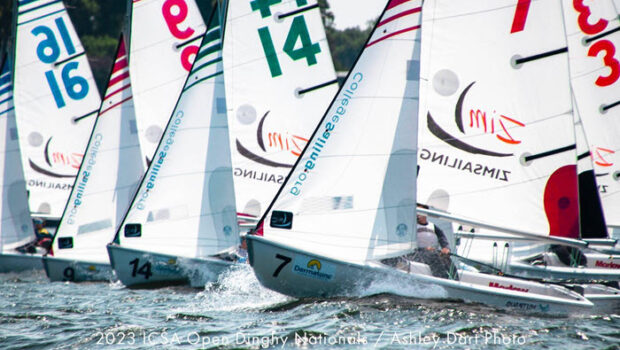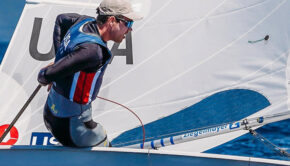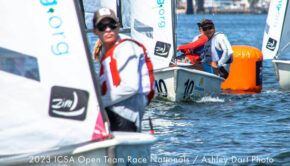How College Sailing impacts the sport
Published on February 7th, 2024
At the Barcelona 1992 Olympics, Paul Foerster and Steve Bourdow won a silver medal for USA in the Flying Dutchman. This was a dominant era for the US Olympic Sailing Program, and seemingly a distant memory considering the current state of the program.
Recent turmoil has stirred commentary on the variables that impact the program, with Bourdow offering his view on the topic:
I’ve heard the argument that college sailing limits US Olympic performance. While my racing and coaching experience is admittedly dated, as an Olympian and very former collegiate coach, I offer this perspective.
First, college sailing doesn’t delay competition in Olympic classes, college does. Here’s why I believe this (just opinions based on my admittedly dated experience):
• The US university environment is more immersive than many other parts of the world.
• A larger percentage of young sailors in the US pursue 4-year university education than other nations.
• US university experience happens two years later than in many nations.
• Sailboat racing in the US is more elitist than many of our competing nations, and members of higher socioeconomic classes pursue higher education at higher rates under higher societal pressure to do so.
Now, about college sailing specifically. After 10 years of collegiate coaching, I had plenty of criticisms to lay on college sailing. One of those criticisms could give weight to the argument that it’s detrimental to Olympic development. It’s that college sailing is not governed by the best-practice standards developed for collegiate athletics by SO many other sports.
Such standards are implemented by NCAA, but I’m not endorsing college sailing join the NCAA, even if it would have them. The primary criticism I have is that there are no season limits and little, if any (I’m not current), limits on practice time.
For my sailors (1993-2002), this meant that the college season began on Labor Day weekend and ended in early June. We practiced nearly year-round, averaging 20 hours/week for the top sailors. The top sailors competed approximately 20 weekends per year, more if nationals qualified, and even more for those with singlehanded aspirations.
College sailing does use simplified boats, this is true. However, college sailing develops skills in a manner that most college-aged non-collegiate sailors envy greatly – discipline, boat-handling to the nth degree, tactical situation variation and repetition, advanced goal-setting and sports psychological development, teamwork, team building, sport-life balance, advanced boat tuning concepts (despite the boats).
These are all skills and experiences that college sailing develops like NO other environment I’ve ever encountered. The problem with college sailing as it relates to Olympic development is that there is simply no time.
The social community aspect of a college team is powerful, but so is the US college experience in general. But, if for example, college sailors couldn’t train or compete collegiately for 4 of 9 months, the best athletes would likely pursue their sport independently in some fashion.
College sailing should develop better boats, but that’s not going to happen, as it requires too much money and the current boats cross over to instructional fleets for all but the most elite teams. College coaches should encourage Olympic development of their athletes, but how can they? When would they?
On one hand, it’s not too late for a 22-year-old All-American to be a successful Olympian, as they have ALL the building blocks needed to succeed in any class. A successful college sailor is far better prepared than most they will compete against in international competition.
However, what they lack is the exposure to international competition in higher performance classes because they simply DON’T HAVE A MOMENT TO SPARE.
Further, by the time many All-Americans reach graduation, they are simply burned-out on sailing. They’ve devoted all of their non-academic time in college to sailing. They’ve practiced and competed more than most Olympians do AND achieved academically at the same time.
These are generalizations, there are many exceptions, every sailor is an individual, but these generalizations are based not based on personal experience, but rather on the 100 or so top athletes I coached through their undergraduate years.
College sailing needs to restrict the amount of time college sailors can compete and practice in college sailing. If it followed the standards that nearly every other collegiate sport adheres to, the negative impact on athletes’ ability to broaden their competitive experiences would be greatly diminished.
Should college sailing do this just so the US can have better Olympic athletes? No, it should do it for the betterment of the athletes overall well-being. Would it help with our Olympic aspirations? I believe it would.
Paris 2024 Olympic Sailing Program*:
Men’s One Person Dinghy – ILCA 7 (41)
Women’s One Person Dinghy – ILCA 6 (41)
Mixed Two Person Dinghy – 470 (19)
Men’s Skiff – 49er (20)
Women’s Skiff – 49erFX (20)
Men’s Kiteboard – Formula Kite Class (20)
Women’s Kiteboard – Formula Kite Class (20)
Men’s Windsurfing – iQFOiL (24)
Women’s Windsurfing – iQFOiL (24)
Mixed Multihull – Nacra 17 (19)
* Quota per event in parenthesis but does not include Universality Places (2 men, 2 women)
Venue: Marseille, France
Dates: July 28-August 9
Details:
• Paris website: https://www.paris2024.org/en/the-olympic-games-paris-2024/
• World Sailing microsite: https://paris2024.sailing.org/









 We’ll keep your information safe.
We’ll keep your information safe.